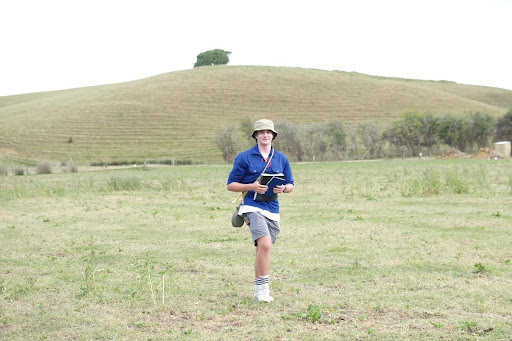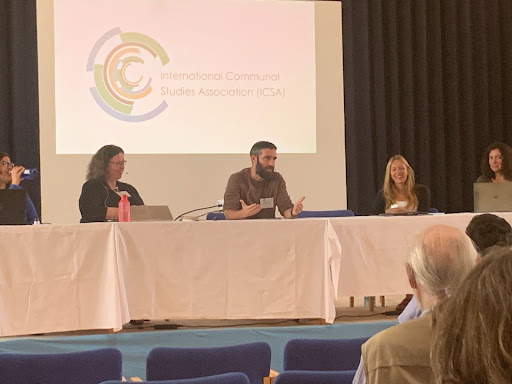Dear Hakhel Communities,
While it may be extremely hot in your part of the world, or extremely cold if you’re in a different part, Hakhel has remained in motion this past month. Some recent highlights include OLAM’s release of a report on Jewish organizational work in Ukraine, in which Hakhel is featured, as well as our participation in the International Communal Studies Association (ICSA) conference in Skanderborg, Denmark (see more on both below).
At the same time, we as Hakhel Intentional Communities are synced inextricably with the Jewish calendar, it should be noted that we are currently in the Three Weeks, an annual Jewish mourning period, with Tisha B’Av coming soon (it’s Sunday, August 7). We mourn many disasters that befell our People, most prominently the destruction of the Temple. This terrible event is traditionally attributed to sinat chinam (baseless hatred) between Jews. How can we work as intentional communities on the baseless hatred that currently fills our polarized world and replace it with trust, security and a sense of love of fellow Jews and humankind?
Nigel Savage, former CEO of Hazon, shared with me recently some implications of Tisha B’Av for the environmental movement, which I feel are relevant to paraphrase here. One of the challenges to engagement with the movement is a lack of sense of timeliness of the cause, and of what one individual’s action will do in the face of a seemingly bottomless crisis. We will never “return to normal” and be able to act with disregard for the environment again. Tisha B’Av can be instructive in this regard as it is an enactment of our personal and collective death – we don’t eat, or greet each other, or engage in marital relations. It forces us to engage with our mortality and consider: How would we change our actions, if we knew our end was near? This Tisha B’Av, what can you as an individual and a community do to change the course of where we are headed – with the environmental movement, and with other causes dear to your heart?
May this Tisha B’Av bring us closer together and push us to action to better our world.
Sincerely,
Deborah Fishman, Hakhel Network Manager

Read this month’s community interview, with Daniel Rosenberg, Treasurer of Habonim Dror Aotearoa New Zealand (HDANZ). Together with Hakhel, HDANZ is building an alumni movement of intentional communities, under the brand name: HeChalutz. Thanks to the connection with Hakhel, together with our mentoring and other support, HeChalutz has been able to adapt the Israeli model of Tenuat Bogrim (alumni movement) and apply it in their areas of operation. Today we are happy to report that there are four vibrant and growing intentional communities in Melbourne, Sydney, Perth and Auckland.

Tell us in a few words about your community and what is special about it.
My name is Daniel and I am the Gizbar (treasurer) of Habonim Dror Aotearoa New Zealand (HDANZ). HDANZ is one of two youth movements in New Zealand and is celebrating its 75-year anniversary this upcoming January. HDANZ is special due to its uniqueness and the fact it provides equal opportunities for all Jewish youth in New Zealand regardless of their background. This means we create a safe space for all Jewish youth to experience and practice their Judaism and also learn about Zionism, Tikkun Olam (fixing the world) and Hagshama (actualisation of Values). HDANZ is also important to the New Zealand communities as for some it is the only Jewish experience they may have in their lives.
What put you on this path to be a community builder and leader?
I was initially put on this path of being a community builder and leader by my Dad who is a boger (past madrich) of HDANZ. My dad led in the 90s and attended the equivalent of Shnat Hachshara in 1990 and was on Shnat the same year as Sacha Baron Cohen. My journey as a madrich (leader) began in 2020 when I led at my first summer camp and then went to Israel as a participant on IBC (Israel By Choice), but I came home early due to COVID-19. On my return to NZ, I immediately went back to leading in HDANZ. Early this year I was Rosh Machane Kaitz (head of summer camp) and ran a successful camp while navigating COVID-19 and had 90 chanichimot (kids) attend. My camp took place 30 years after my dad ran his camp.
How is Judaism part of your community’s life and identity?
My main motivation behind being involved in Habo is to improve the movement and leave it in a better place than I found it to ensure it stays around for another 75 years, and to build the next phase of alumni intentional communities. Judaism is important in New Zealand as the community is so small. You may have heard people say they’re one of three Jews in New Zealand and while this is an exaggeration, compared to other communities around the world this seems true. Because we have such a small community, it is very close and everyone knows everyone. This means everyone my age that is Jewish grew up together through the youth movements and now most of us are the ones running the youth movements. In NZ Habonim Dror and Bnei Akiva are both very important for creating safe spaces for Jewish Youth and ensuring Jewish continuity. We are very grateful for all the support we receive in New Zealand and also overseas from HeChalutz, Hakhel and other organizations.
What is one takeaway or lesson from your work that you would like to share?
I feel the one key takeaway from all my work with Habonim Dror and Hakhel has got to be when there’s a will there’s a way. Throughout the COVID pandemic it has been increasingly hard to run movement activities but we have all managed to come together and run 4 successful camps and weekly kenim and seminars since COVID New Zealand and we continue to do so in order to ensure Habo remains prevalent in our community and in kids lives.


The International Communal Studies Association (ICSA) conference took place recently in Skanderborg, Denmark. Hakhel Director Aharon Ariel Lavi and Network Manager Deborah Fishman had the opportunity to attend in person, while Sephirah Oshkello and Roger Studley also represented Hakhel virtually on a panel about Jewish intentional communities and Jewish cultural continuity.
click here to watch the recording

OLAM has published a pioneering research report on the work of Jewish organizations in Ukraine, including Hakhel, called “Unprecedented Response and Collaboration: Preliminary Lessons from Jewish and Israeli Responses to the Crisis in Ukraine.” We are proud to share the results with you, as we prepare for the next phase.
Wishing us all peaceful times.
Here is a brief summary of the report.

From the Hakhel Creative Gatherings Team:
We are super stoked that there has been motion with the Hakhel Creative Gatherings project to take place in South Africa. The date is projected for the 1st November – 9th November 2022. Committees are being set as we wait for a few more forms to roll in. Thanks to those who have already completed this form. If you’re interested, be sure to click the button below.
click here for the hakhel creative gathering in south africa


